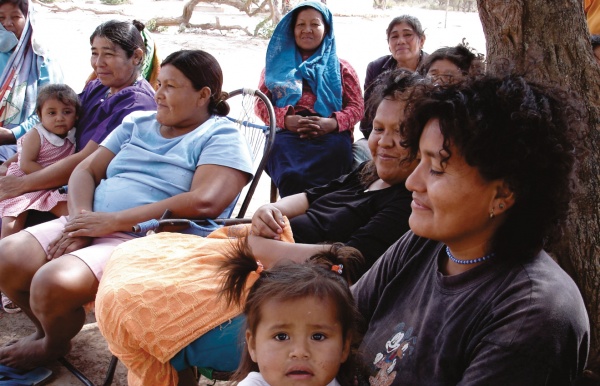Faces, Voices and Places in the Bolivian Chaco
The Faces, Voices, and Places (FVP) Initiative was carried out in the Bolivian Chaco region from 2009 to 2011. Promoted by the Pan American Health Organization, this regional initiative helps middle- income countries reduce inequality in their poorest areas and strengthens citizenship through shared responsibilities and a rights- based approach. It also promotes intersectoral and interagency action with a view to reaching the Millennium Development Goals (MDGs). Besides implementing activities at the community level, FVP has developed a training plan on health, the environment, food security, and health and nutrition surveillance. Based on a study conducted in the border region of Argentina, Brazil, and Paraguay, the initiative stressed the need to strengthen local coordination around joint health strategies to ensure that public health measures reach the entire population. National and local agencies collaborated on an intersectoral plan that stressed active local participation. PAHO/WHO provided technical cooperation for programs in maternal and child health, malnutrition, and neglected infectious diseases (e.g. prevention of Chagas disease, control of soil-transmitted helminths, and rabies prevention in dogs), as well as for initiatives to improve water quality and strengthen food security by establishing cooperatives and planting orchards.
Meets the criteria established under Health in All Policies:
- Political commitment. Although FVP might not have enjoyed political commitment at the highest levels, it had national support from the Ministry of Health and Sports as well as local authorities.
- Separate structure. The initiative did not have a separate operational structure. However, an intersectoral mechanism was established to implement a national policy, with significant support from international cooperation agencies.
- Participation of other sectors. In addition to the national Ministry of Health and Sports, the local health services and other sectors supported the FVP initiative. For example, the departmental Health Services Office (SEDES) in Santa Cruz carried out education, prevention, and assessment activities through its programs on maternal and child health, malnutrition and Chagas disease, among others. Gabriel René Moreno University (UAGRM) conducted school-based de-worming under the auspices of the autonomous government of Santa Cruz. Other institutions provided technical support for the establishment of family orchards and for poultry production. Charagua municipality monitored water quality with technical assistance from PAHO/WHO.
- Separate budget. While the initiative did not have a separate budget allocation, it was financed by PAHO/WHO and national counterparts provided human resources.
- Focus on reducing inequity. The Faces, Voices, and Places initiative's goal of reducing inequity was reflected in its selection of target communities and its focus on addressing the needs of indigenous populations.
- Commitment from other sectors. FVP entailed interactions between the local health, food safety, and animal health authorities, coordination with departmental authorities, and national supervision.
- Public Policy. The initiative contributed to the development of public policies that impact health by improving coordination and collaboration with local communities on health care and promotion. As a result, SEDES technical teams have considered spearheading departmental and national actions to improve inter- and intra- institutional coordination for efficient health services delivery.
- Evidence of results. There is scientific evidence of the results of the FVP initiative. SEDES reported positive outcomes. FVP brought the target communities to the attention of local and departmental health authorities, highlighting their needs for basic health and sanitation to reduce morbidity and mortality. It raised awareness among local residents about the importance of active community participation. FVP empowered women in particular by establishing a poultry cooperative and increasing the number of families involved in poultry production. Finally, the FVP initiative included a program to treat school-age children for parasites.
- Social participation. The FVP initiative conducted surveys to identify needs for food, health, and sanitation. Its activities reflected close coordination with community leaders and respect for their traditions and cultures.
